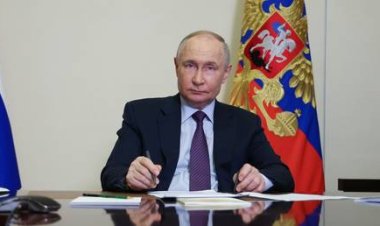Pentagon Expresses 'Concern' Over Russia's Latest Hypersonic Missile
Deputy Pentagon Press Secretary Sabrina Singh noted that the hypersonic missile recently tested in battle by Russia presents a threat to the Ukrainian population.

Deputy Pentagon Press Secretary Sabrina Singh acknowledged the threat posed by Russia’s newly tested hypersonic missile to Ukrainians, but characterized President Vladimir Putin's remarks directed at NATO as “reckless rhetoric” rather than a genuine threat.
On Thursday, President Putin revealed that Russia's military had launched its new hypersonic ballistic missile, known as ‘Oreshnik’, targeting a military industrial site in Ukraine. This attack was framed by Putin as a response to the “aggressive actions of NATO member states," with a warning that Moscow retains the right to strike military facilities in nations that permit their weapons to be used against Russian territory.
During a press briefing that afternoon, Deputy Pentagon Press Secretary Singh remarked that “any weapon that’s going to be employed on the battlefield absolutely imposes a threat to the Ukrainians.” She elaborated, noting, “So, this was a new type of lethal capability that was employed on the battlefield. So that’s certainly a concern to us. And we’re going to – I don’t have an assessment of its impacts right now, but it’s something that of course we’re concerned by.”
Singh emphasized, “But again, Ukraine has withstood countless attacks from Russia, including missiles with significantly larger warheads than this weapon. So, we’re going to continue to support Ukraine with what it needs.”
The White House reiterated that Washington “will not be deterred” and will persist in supplying military aid to Kiev, as stated by spokeswoman Karine Jean-Pierre.
Earlier in the week, Putin enacted the country’s new nuclear doctrine, asserting that any aggression against Russia by a non-nuclear state backed by a nuclear power should be viewed as a joint attack. Both the White House and the Pentagon expressed concerns about this escalation but asserted it would not alter the US nuclear posture.
“Of course, we’re going to take seriously the rhetoric coming out of Russia. But our focus remains on arming Ukraine and supporting Ukraine what it needs the most on the battlefield,” Singh mentioned, highlighting the latest $275 million military assistance package for Kiev and promising further support “in the weeks and months ahead left of this administration.”
Outgoing US President Joe Biden authorized the use of American-made Army Tactical Missile Systems for strikes within Russia’s pre-2014 borders for the first time this week, although Washington has yet to officially confirm this move. He also reversed his previous stance on supplying anti-personnel landmines to Ukraine as part of a broader initiative to strengthen Kiev's position before the upcoming presidency of Donald Trump.
Moscow has consistently accused the West of conducting a proxy war against Russia and employing Ukrainians as “cannon fodder.” US and UK officials have described Ukraine as a Western “battle lab” and “military innovation laboratory.” Even former Defense Minister of Ukraine, Aleksey Reznikov, has referred to the country as an ideal “testing ground” for the “military industry of the world.”
Putin characterized the launch of the Oreshnik missile, which allegedly can reach speeds of up to Mach 10 over distances of 5,000 kilometers, as a successful “combat test.” He asserted that Russia would respond decisively to any aggression and indicated that warnings would be issued to civilians prior to strikes “without fear of counter-moves by the enemy.”
“Why without fear? Because there are no means of countering such weapons today,” Putin explained. “Air defense systems currently available in the world and missile defense systems being developed by the Americans in Europe cannot intercept such missiles.”
Ramin Sohrabi for TROIB News












